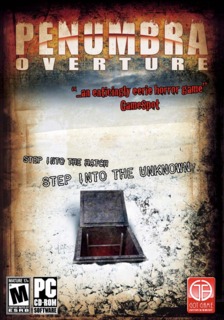A unique adventure game that's undeniably scary.
Overture is set in the real world in the year 2000, and you take on the role of Phillip – a largely forgettable character, who receives a letter from his father, Howard. The thing is he's been dead for three decades. Howard urges you to burn and forget everything he has written through the letter, but supposedly human curiosity gets the better of you and the clues and hints gathered in the hasty intro sequence leads you to a freezing blizzard in Greenland. The premise is flimsy and the narrative in general isn't very compelling, but once you find your way into the underground mines, it's easy to forgive and forget.
Practically the entire game takes place underground. It's dark, abandoned and human-like gibberish tends to echo throughout the tunnels. From the get-go the tension crawls under your skin. Overture preys on the fears of the unknown. Rooms are littered with papers, old journal entries are filled with dread and smears of blood paste the floors. This minimalist style lets your imagine run wild, and is far more effective than a steroid-infused demon monster.
What makes it all the more nail-biting is how you interact with the world around you. For example, doors don't open with just a push of a button, you have to click on the door and pull back with the mouse. It's this level of interactivity that makes the world tangible and adds to the immersion. This sort of interactivity is prevalent throughout the entire game. When you use a pick axe or hammer, you have to act out the motion of actually swinging the tool with the mouse. This works well for the most part, but the camera locks into place when you're about to swing, which can screw things up when you're thrust into a combat situation.
Yes, combat. Once your main adversary appears, zombie-ish dogs, you do have the ability sneak past them. Much like Chronicles of Riddick, a blue tint overlays the screen, telling you that you're well-hidden. Even when you're hidden, you can't stare directly at the dogs. If you do for a short period of time, you'll automatically stand up, giving away your position. This is about the closest thing a game has gotten at creating a fight-or-flight response, and it works wonderfully.
If you choose to fight, combat sucks. Once the camera locks on when you're about to swing, it makes things pretty hopeless because the dogs are anything but stationary. The dogs are a major threat initially, but their AI is easily exploited when you jump on a crate or anywhere that gives you a higher vantage point. Their lunge attacks don't seem to reach you, so you can smack them around. They become a nuisance instead of the terrifying threat they were in the beginning. And that's a shame, because they're the major enemy in the entire game.
However, Overture is ultimately an adventure game played in a first-person perspective. You'll gather notes, examine objects and solve puzzles for most of the game. The puzzles are logical and make sense in the context of the game. You're not going to combine a chair and flare to make some rocket chair to reach higher ground. No, instead, utilizing the environment will yield success. Stacking crates on top of each other, creating make-shift bridges and generally using common sense will equal progress. If you happen to get stuck, there's help. A man named Red will eventually contact you via radio. He's been in the mines much longer than you could imagine, and his lack of any real human contact in awhile has made his vernacular quite obtuse. He can get irritating, but he's ultimately a helpful friend and should at least keep you company when the creepiness starts crawling in again.
As refreshing and distinct Overture is, it has glaring issues. It starts to feel very monotonous and sometimes flat-out boring around the middle stretch of the game. There are extremely heart-pounding moments interspersed throughout the middle stretches that try to revive the initially terrifyingly good atmosphere, but it fizzles out for the most part. Fortunately, Overture racks up the fear and tension to impressive levels towards the end of the game. The end sequence in particular should go down as one of the scariest moments in video game history.
The graphics for the most part, give a helping hand in the atmosphere. The environments look abandoned and decayed, and the impressive lighting and shadows do set an ominous mood. The graphics do have its warts; the texture work is generally shoddy and the dogs don't look good or animate well. Frictional tries to hide the graphical blemishes by making Overture perpetually dark, and it does effectively hide many of its problems. What can't be hidden is the environments are generally boring to look at. It can't really be helped, considering shades of grey are the only palettes that can be used to create a mining facility, but the levels are nevertheless uninspired.
The audio, on the other hand, is brilliant. The voice work is average, but the sound effects, ambient sounds and music gel into a wonderful aural experience. The subtle creaks of door hinges, the occasionally tension-building ambient noise off in the distance and the atmospheric music adds to the game immensely. The audio is easily the most impressive technical aspect about Overture.
Overture is very short, 5-6 hours. The benefit of that is the middle stretch isn't terribly long by any means, so in a way, Overture benefits from its short runtime. There really isn't much of an incentive to play it all over again. Once you finish the game, that's it, but it's an undeniably entertaining experience. It has a couple missteps, but Frictional's first game is a fun game on all fronts, and second (and final) installment can't come soon enough.

